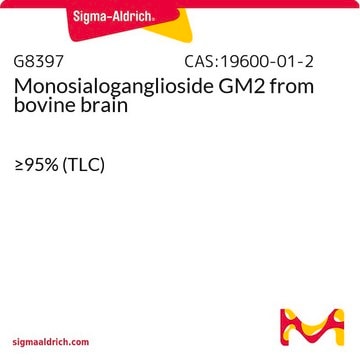G5660
Lysoganglioside-GM1 from bovine brain
≥95%, lyophilized powder
Sign Into View Organizational & Contract Pricing
All Photos(1)
About This Item
Recommended Products
Related Categories
Biochem/physiol Actions
Suggested to be a modulator of cell growth and signal transduction. Accumulates in the nervous system of patients with GM1 gangliosidosis. Used for the preparation of GM1 derivatives containing different fatty acids, fluorescent tags, or other residues.
Other Notes
Gangliosides are major constituents of neuronal cell membranes and endoplasmic reticulum; contain a sialated polysaccharide chain linked to ceramide through a β-glycosidic linkage; for classification of gangliosides see Svennerholm, L., et al. (eds.), Structure and Function of Gangliosides, New York, Plenum, 1980.
Storage Class Code
11 - Combustible Solids
WGK
WGK 3
Flash Point(F)
Not applicable
Flash Point(C)
Not applicable
Personal Protective Equipment
dust mask type N95 (US), Eyeshields, Gloves
Certificates of Analysis (COA)
Search for Certificates of Analysis (COA) by entering the products Lot/Batch Number. Lot and Batch Numbers can be found on a product’s label following the words ‘Lot’ or ‘Batch’.
Already Own This Product?
Find documentation for the products that you have recently purchased in the Document Library.
Tubaro, E., et al.
Eur. J. Pharmacol. Environ. Toxicol. Pharmacol. Soc., 248, 175-175 (1993)
T Kobayashi et al.
Journal of neurochemistry, 59(4), 1452-1458 (1992-10-01)
By using a sensitive method, we assayed lysocompounds of gangliosides and asialogangliosides in tissues from four patients with GM2 gangliosidosis (one with Sandhoff disease and three with Tay-Sachs disease) and from three patients with GM1 gangliosidosis [one with infantile type
A Kharlamov et al.
Proceedings of the National Academy of Sciences of the United States of America, 91(14), 6303-6307 (1994-07-05)
A bilateral photochemically induced thrombotic lesion of rat sensorimotor cortex (approximately 3 mm in diameter and 25 mm3 in volume) is associated with a persistent cognition (learning and memory) deficit, which was evaluated with water maze tasks. The N-dichloroacetylsphingosine derivative
R T Huang et al.
FEBS letters, 281(1-2), 39-42 (1991-04-09)
Fluorescent dansyl derivatives of 3 natural sphingolipids (gangliosides, cerebroside and sphingomyelin) were shown to be readily taken up by culture cells (HeLa-, MDCK- and primary rat brain cells). A part of the incorporated fluorescent sphingolipids remained associated with the cells
Y A Hannun et al.
Science (New York, N.Y.), 235(4789), 670-674 (1987-02-06)
Lysosphingolipids potently and reversibly inhibited protein kinase C activity and binding of phorbol dibutyrate in vitro and in human platelets. As with activation of protein kinase C by phosphatidylserine and sn-1,2-diacylglycerol, inhibition was subject to surface dilution. Accordingly, inhibition in
Our team of scientists has experience in all areas of research including Life Science, Material Science, Chemical Synthesis, Chromatography, Analytical and many others.
Contact Technical Service







